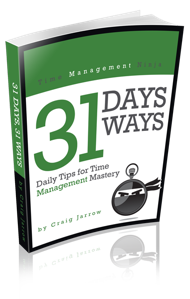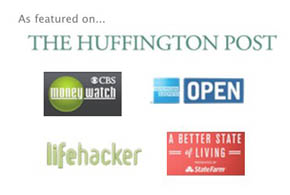Imagine lots of clients all needing their tax returns prepared and filed before a single date. If you get that done, you are given the go-ahead to repeat, next year. If you fail, you are immediately toast.
Yup, Certified Public Accountants more than most other professionals don’t get a second chance when it comes to time management and getting organized. Miss one deadline and you’re shown the door.
If you operate as a small business, there are valuable lessons to be learned from a CPA. Here are 9 tips for better time management, from a tax professional who has been coping with the onslaught of crunch time, for decades.
- We’re big on using logs. We log every piece of mail that comes in from or is mailed out to a client. Also, if we’re sending out a letter on behalf of a client, say to the IRS, it gets logged too. This way we know when clients’ work came in so it doesn’t sit around too long. A bonus: this system prepares us to answer incoming status queries speedily.
- We keep as little paper as possible, printing almost zip. Nowadays, the government copy of tax returns are submitted electronically, our clients are given a pdf containing their tax return, and we electronically “print” our copy of the return directly into our document management system. This is a huge time saver over the old system where tax returns were printed, collated and mailed.
- We take the paperless plan a step further. All client documents whether generated by us, received from them or received from a third-party are scanned and kept electronically by year within client folders.
- A large white board lists all deadlines in the next 4 months. This provides an easy and quick reference for everyone in the office to review work in progress. We cross off projects as completed.
- Our workflow is the stop-start kind. Often, work that has been started is put aside when we discover missing docs. If you see a similar pattern in your business, consider listing the missing items in each client folder, as we do, and physically filing them in a drawer dedicated to “holding pattern” work. Later on, they are pushed forward to drawers marked “ready to be worked on,” “awaiting partners review,” or “submitted to IRS and awaiting acceptance.” Another tip: Maintain a spreadsheet log of each drawer’s contents.
- We utilize software that tracks time, schedule and client contact info. Everyone in the office has access to this. We review this every day during tax season to see what clients and projects are yet to be dealt with.
- Outsource, that dirty word. We use outsourcing (with our clients’ permission) to handle data entry during peak crunch times, allowing us to quickly turn around work. By the way, all outsourced work is subject to the same in-house review as staff work performed in-house. This makes it feasible to outsource, instead of hiring additional temp staff.
- Email, a real time killer. We review email 3 times a day and no more.
- Major tool: Use multiple monitors with programs open at the same time. Tax software, time and billing software, Word, Excel … all stay open. It was suggested to me years ago to add a second monitor, which I did. It was great. I thought if this is so great how would it be to add a third monitor, which I did. Great. I now have 4 monitors. Can 5 be far behind?
Yes, some of these recommendations run counter to the advice of other productivity gurus. Yet as a CPA firm that depends on managing time and organizing work to meet hard and fast deadlines, there is no room for error in our business.
Do you have room for error in yours? A better accounting of your workflow may be the time management ticket for you.
Question: What tips can you add to this list that for better time management at your business?

 I am the author of Time Management Ninja and help individuals and companies reclaim their time to be more productive. As well, I am the author of the book
I am the author of Time Management Ninja and help individuals and companies reclaim their time to be more productive. As well, I am the author of the book 

Paul: I love the push you’re making for a digital existence in the work environment. I just co-authored a booklet called “Working on the Move” that is a nice compliment to come of these suggestions. Note, I’m happy to provide you and the readers here a PDF copy for free if you let me know where you’d like it e-mail via reply to this post.
As a recovering large-firm attorney turned “productivity guru” to professional service providers, I’ve slowly fought the migration battle myself. Using Dropbox and Evernote, along with Office 365 and a SaaS accounting platform, I operate almost exclusively in the proverbial Cloud today. For better or worst, I’m almost 100% professionally digitized!
Now it’s time for the other shoe to drop: Productivity is about getting things actually done (versus just ping-ponging around all day). Productivity results when we’re focused. Focus comes from a quieter internal and external world. My point is that we can spend oodles of time setting up a digital world, but if we don’t focus on being focused, then we’re just wasting that time. And, to put a fine point on it, the time we’re wasting isn’t work time. It’s family time because for most professionals, the work must eventually get done. Therefore, any wasted time gets deducted from the allotment we have for non-work activities – like family time.
My advice to all those who work is to leverage Paul’s suggestions above with the sole intent of maximizing the value they have for increasing your focus – your productivity – because when your productivity increases, the amount of time you must spend working goes down. Less time at work means … Well, you get the message!
Good stuff, Paul. Thx for sharing!
Some people try to stop the automatic update setting,so you here the right place,just connected here this link windows 10 update settings i hope you really happy to get the simple method for this issue.
Great to stumble upon your blog, I was looking for learning more about cpa… this article of yours is very helpful to understand how cpa can help managing time and keeping things organized…tanks you very much for sharing this blog. I have also found this resource stuartsnowaccounting.co.nz useful and its related to what you are mentioning.